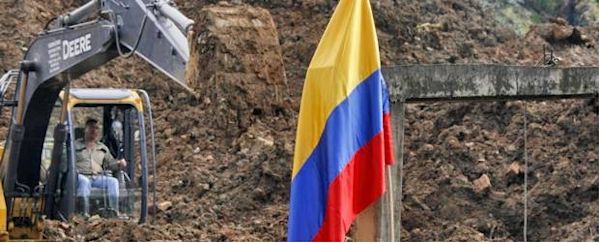
This winter is said to be the worst in the last 60 years in Colombia. In the 45 days since I arrived in Medellín, roughly three have not included a rainstorm. I’ve just come to accept the fact that most days I will get stuck in a torrential downpour, and that my umbrella will be rendered useless. The locals like to remind me that while I have been dealing with the rain for only a few weeks, this has been their reality for months, and there is no end in sight. Official weather reports estimate that the rain will continue through March.
Around the country, Colombians are feeling the effects of winter. Medellín itself is located in the bottom of a valley, and many of the communities up in the hills have suffered devastating mudslides. Beyond the inconvenience of the road closures (most major routes in the state of Antioquia are either closed or severely delayed), mud has crushed entire neighborhoods and buried families. About two weeks ago, the president declared a state of emergency. The government emergency fund will cover only about one tenth of the damage that has been done. To date, 200 people have died, another 250 are injured, and about 120 more are declared missing. Almost 300,000 homes have been affected, with over 2,000 destroyed completely. The trauma begs the question: what is the role of microfinance in the wake of natural disasters?
Let’s look at an example that hits a little too close to home. In early December, a neighborhood called La Gabriela found itself in the path of a violent mudslide. La Gabriela is three blocks from Interactuar–a local microfinance institution–and home to many clients. An estimated 100 individuals died in the event. Over 130 homes have been evacuated. After more than a week, the entire zone is still completely blocked off to outside traffic.
 Photo Credit: Reuters, Albeiro Lopera
Photo Credit: Reuters, Albeiro Lopera
Interactuar’s first response actually had nothing to do with microcredit. Rather, acting as citizens of Colombia, the employees of Interactuar took up a collection of food and materials to donate to the victims and victims’ families.
Although microfinance is not a solution that can necessarily address the immediate trauma, it has potential to help families and entire neighborhoods in the wake of crisis. Sound microfinance policies enable communities to rebuild and reestablish their lives. While the institution is still working to define exactly how it will respond to the crisis, Interactuar has a number of tools at its disposal to aid the devastated community.
First, all Interactuar loans carry insurance policies. All loans require a life insurance policy, which means that in the case of the death of the borrower, the loan debt is forgiven (i.e. not passed along to family members). All but the largest loans carry a second type of insurance as well, which covers any business loses—inventory, fixed assets, etc.—caused by disaster. It hardly need be said that in cases of extreme disaster—when entire families perish—there is no one to collect the insurance. Or, even if some family members survive, collecting insurance on is not at the top of the to-do list; it falls far below feeding loved ones and mourning loses. However, Interactuar is fighting on behalf of its clients whose homes fall just outside the immediate disaster zone. That is, since the home or business is technically still standing, the insurance company is arguing that there was no real damage and thus that the client cannot collect. However, Interactuar will counter that because these people cannot even enter their homes—much less sell anything—the insurance should cover 2 to 3 months of payments on the outstanding loan while the individual regroups. Further, the sad truth is that Interactuar can additionally argue that the insurance company is actually saving money since the individuals who died with their entire families will not be collecting.
Second, Interactuar is able to offer preferential loan terms and products to clients who lost their businesses in the mudslide, i.e. those right outside of the immediate danger zone. Clients can either get a refinanced loan with a grace period, or a short-term loan to cover costs while business gets back up and running. Interactuar is even considering offering zero percent interest loans to clients who qualify (pending board approval). However, decisions will be made by the loan officer and credit committee on a case-by-case basis, to ensure that the individuals who most need help are receiving it.
Finally, Interactuar can help by continuing to provide the long-term support to the community that it has become known for. This includes continued access to Interactuar’s credit services, as well as its many education programs, nutrition lab and design center, and consulting services.
Join Interactuar’s lending team here!
Betsy McCormick, KF12, Medellin, Colombia
PREVIOUS ARTICLE
From Rwanda to Kenya: Why Lend Through Kiva →NEXT ARTICLE
Vote for Kiva in the American Express Members Project! →














